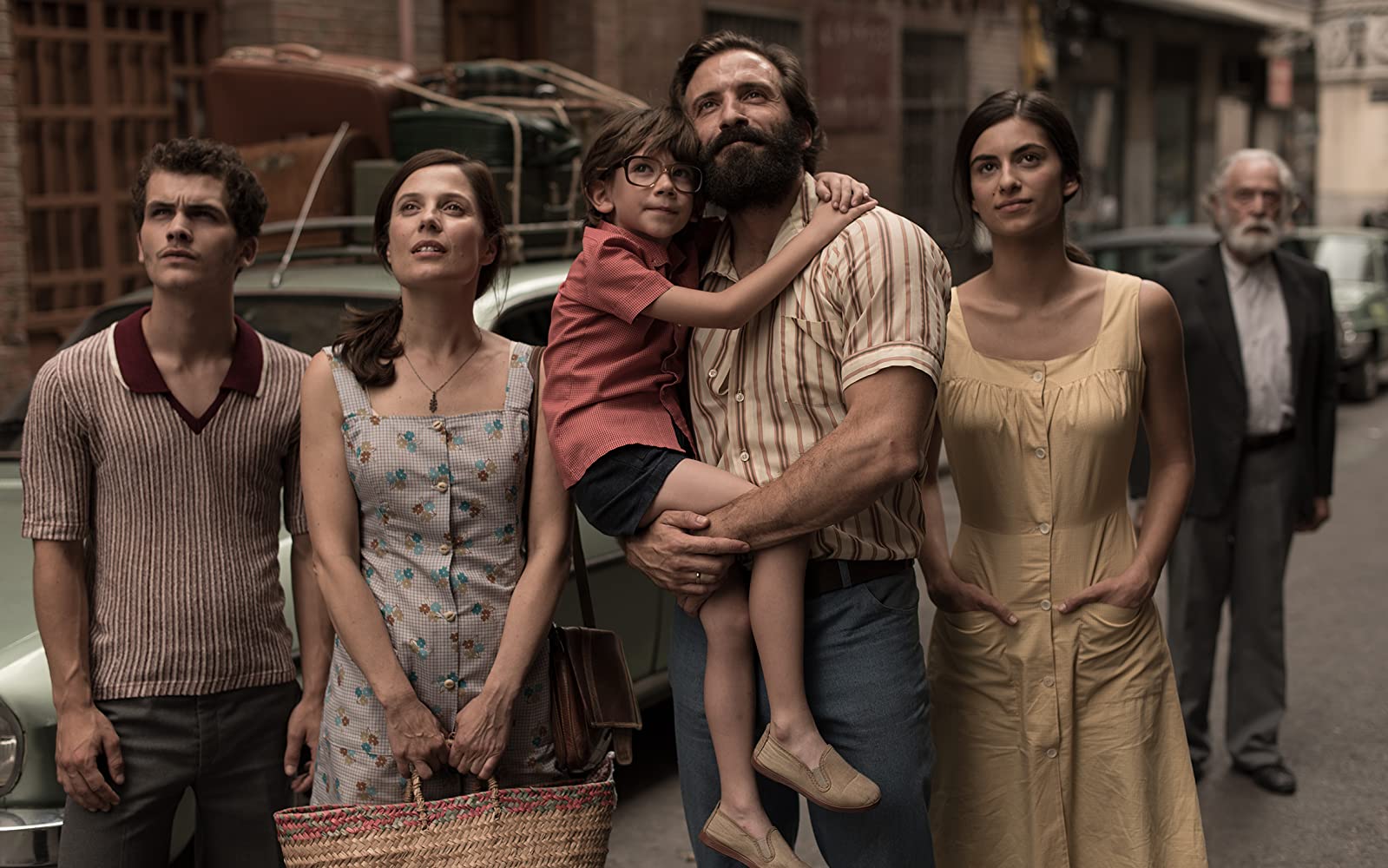What to Watch Verdict
'32 Malasaña Street' is familiar, no doubt, but with comparisons to 'The Conjuring' and weight put into Spanish Franco-era traumas felt long after his death, it's a welcome familiarity that executes above truly generic levels.
Pros
- +
🧵 The horrors of national histories.
- +
🧵 Favorable genre comparisons.
Cons
- -
🧵 Yes, we've seen this before.
- -
🧵 Overloads its third act.
An apartment with an unspeakable past. An excitable family looking forward to a future in their new dream dwelling. 32 Malasaña Street begins as countless move-in horror stories have introduced themselves before, where mortgage debts are far from the scariest presence. Albert Pintó’s post-Franco era haunting captures Spain in 1976, where impoverished masses endured for the sake of better lifestyles while religious unacceptance of anything considered abnormal created monsters born from shame. It’s a horror story that, in moments, feels specific to a bygone period in history, but upon dissection, represents archaic shunning that can resurface when ignorance becomes a nation’s common language once again. We’ll get there soon enough.
Candela (Bea Segura) and her family flee their humble village for a big-city unit, 3B, on 32 Malasaña Street. Husband Manolo (Iván Marcos) is hired by the Pegaso trucking company, while Candela finds employment in retail at a shopping mall to afford their new upgraded lifestyle. Although, youngest son Rafael (Iván Renedo) isn’t sold on their fancier digs at the onset. Neither is middle daughter Amparo (Begoña Vargas), who left her boyfriend behind. Pepe (Sergio Castellanos), the stuttering eldest child, seems unfazed by the uprooting. Candela and Manolo breathe easy in their spacious new residence, but their “administrator” (played by Javier Botet) leaves out a precious piece of information: the death of a neighbor years prior. One whose soul is still tethered to the complex, that finds pleasure in tormenting Candela’s children.
The journey of 32 Malasaña Street lives and breathes Spanish interpretations of American horror influences. From Poltergeist to The Taking Of Deborah Logan, James Wan’s exploitation of cloaking shadows, Pintó’s vision is rich with teachings from around the genre he honors. In addition, a writing team consisting of Ramón Campos, Gema R. Neira, David Orea, and Salvador S. Molina find sympathy for their devil by showing how hatred only breeds more beastly retaliations, spinning an LGBTQ+ positive twist into their climatic paranormal encounter. What starts as a demonic kidnapping becomes an architecturally sound haunted house design that then recontextualizes itself like The Queen Of Black Magic in a later-act reveal. Ordinary subgenre appeal that’s renovated after years of dust and decay, presented with confidence.
Integral to the success of 32 Malasaña Street is yet another torn-from-nightmares Javier Botet monstrosity, this of a decrepit, ancient-looking grandmotherly apparition who stalks the hallways, closets, and nether reaches of Candela’s home-sweet-hell. Pintó pricks our nerves with the usual from-darkness lunges, but employs an arsenal of variational techniques in doing so. Maybe it’s a “Granny” puppet that converses with Rafael directly through a black-and-white television set. Perhaps it’s perspective trickery as Amparo sees her senile grandfather (José Luis de Madariaga) through the kitchen doorway, bent over the stove, but through the door’s window, it’s Botet’s gangly lurker. Setups won’t fool hardened genre veterans, or escape shoehorned clichés (a pregnancy subplot hits from left field), but that doesn’t impede one’s enjoyment during precision punches of housebound horror.
More importantly, 32 Malasaña Street chooses a moment in history for reasons beyond the fact that technological limitations make for ease of scares. As Amparo’s investigation unlocks the mysteries of an adjacent apartment, we learn about the ostracization that caused someone free-at-heart to die alone, begging for compassion. What appears as isolated incidents reveal themselves to be intertwined: Pepe’s secret admirer who trades handwritten notes via his window clothes drying wire, the significance of basement meetups, no longer are these random asides, but linked communications with an unrested soul.
It’s better left for your discovery, but mentions of “freaks” and “outcasts” belabor a climactic pivot as frustrated as the ghost who’s currently possessing a paraplegic, wheelchair-mobile medium who rushes to Candela’s aid. What could be another fight against phantasms for the sake of creepiness finds responsibility in its themes, anger in its voice, and salvation in condemnation that denounces the most disheartening evils of all: societal failures. It’s going above and beyond even when equality and representation aren’t “requirements,” although it’s no wonder some of the year’s most lasting genre titles have the most to say about our world, living or dead.
Albert Pintó’s 32 Malasaña Street welcomes viewers into a house of familial horrors, as cinematographer Daniel Sosa's camera cautiously weaves throughout adjoined rooms with a common atmospheric thread: ominous unrest. It’s something out of The Conjuring 2, more specific to busier community lofts, where screams escape at the sight of boney hands reaching from under furniture or flowing ghoulish gowns swirling around their paralyzed victims. The comforts and safeties of living quarters are ripped from underneath an already on-edge family, always tiptoeing around impossible explanations for their cursed, unholy homeowner’s dilemma. All that, and it takes a vocal stance against bigotry? I’ll continue to scream from the mountaintops about how international horror is paving the way for inclusive conversations within a genre that’s often incorrectly labeled as “pointless scares.”
The latest updates, reviews and unmissable series to watch and more!
32 Malasaña Street is part of our Nightstream coverage.
Matt Donato is a Rotten Tomatoes approved film critic who stays up too late typing words for What To Watch, IGN, Paste, Bloody Disgusting, Fangoria and countless other publications. He is a member of Critics Choice and co-hosts a weekly livestream with Perri Nemiroff called the Merri Hour. You probably shouldn't feed him after midnight, just to be safe.


